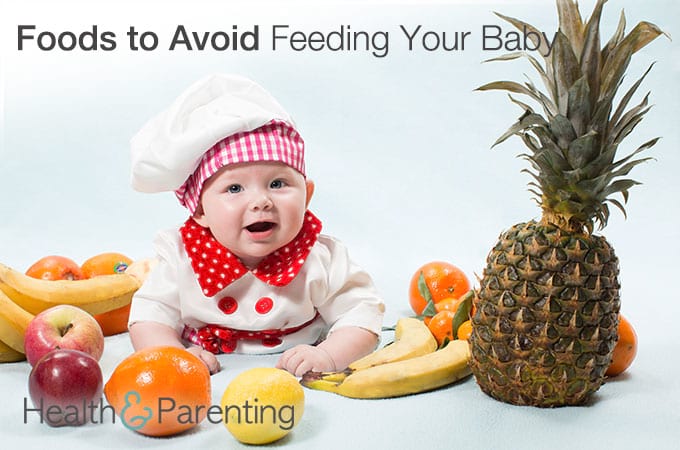For the first several months, your baby’s menu was limited to breastmilk, formula or a bit of both. But as your baby grows up, you can gradually add food and expand what she eats.
It’s often fun to offer your baby new food choices and learn what she likes and what makes her turn her nose up. But it’s also important to know which foods you should avoid giving to your baby.
There are certain foods that present a choking risk or have a chance of getting your baby sick. Keep in mind, if you have any doubts about whether a certain food is safe for your baby, hold off. Talk to your pediatrician before adding it to your baby’s diet. Below are some foods that you should wait to offer until your baby is older.
Honey: Honey is a no-no for babies since it occasionally can contain clostridium botulinum spores. The spores are usually not harmful to adults since their intestinal tract can prevent the spores from growing and causing illness. But your baby’s intestinal tract is still maturing, and the spores can cause your baby to get sick with botulism. Botulism can cause poor appetite, dehydration and possibly pneumonia. Wait until your little one is at least a year old to give her honey.
Cow’s milk: Cow’s milk can be hard for babies under a year old to digest. Plus, cow’s milk does not have all the nutrients that your baby needs during his first year of life. Until your baby reaches his first birthday, breastmilk or formula are the best sources of milk.
Whole grapes: Although they are good for your baby, whole grapes and other chunky foods can be a choking hazard. Keep in mind, your baby is still getting the hang of chewing and eating solids foods. If you want to give chunky foods, such as grapes, cut them lengthways or into very tiny pieces.
Oranges: Oranges are full of vitamins, but they are also acidic and can make your baby sick to his stomach. Acidic fruits can also cause a rash on your baby’s diaper areas, which is no fun. Skip the oranges until your baby is at least a year.
Peanut butter: Certain foods that are sticky, such as peanut butter, are also easy for your baby to choke on and should be avoided. Peanuts are also a common cause of allergies in kids. Many pediatricians recommended waiting on certain foods until you figure out if your little one has food sensitivities.
Certain veggies: Although vegetables, such as squash and carrots, are good for your baby, certain vegetables including lettuce, beets and spinach contain nitrates that your baby can not yet process. Although you may not have been planning on serving spinach to your baby, it’s helpful to be aware of which vegetables you should avoid.
Salt: Don’t add salt to any of your baby’s foods. Too much salt is not good for anyone, but your baby’s kidneys are not developed enough to handle the added salt.
Written by MaryAnn DePietro @ writerlady34
This information is not intended to replace the advice of a trained medical doctor. Health & Parenting Ltd disclaims any liability for the decisions you make based on this information, which is provided to you on a general information basis only and not as a substitute for personalized medical advice. All contents copyright © Health & Parenting Ltd 2016. All rights reserved.










